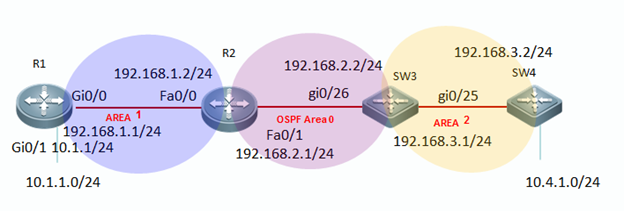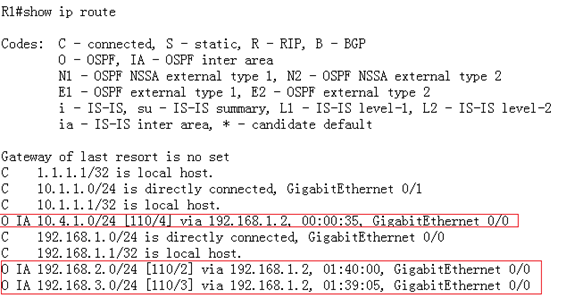|
Overview OSPF (Open Shortest Path First) is an internal gateway routing protocol based on link status developed by the IETF OSPF work group. OSPF, a routing protocol specific for IP, directly runs on the IPlayer. Its protocol number is 89. OSPF packets are exchanged in multicast form using the multicast address 224.0.0.5 (for all OSPF routers) and 224.0.0.6 (for specified routers). Note: we recommend that you can give priority to OSPF to build your network I. Requirements Use OSFP to build your network and every node in the network can communicate with each other. II. Network Topology  III. Configuration Tips 1. Assign IP addresss to R1, R2 SW3 and SW4 2. Initialize OSPF process on all devices and define corresponding interfaces which OSPF runs and define the area ID for those interfaces. 3. (Optional) Modify network type on interfaces that have OSPF enabled IV. Configuration Steps 1. Assign IP addresss to R1, R2 SW3 and SW4 Ruijie(config)#hostname R1 R1(config)#interface gigabitEthernet 0/0 R1(config-GigabitEthernet 0/0)#ip address 192.168.1.1 255.255.255.0 R1(config-GigabitEthernet 0/0)#exit R1(config)#interface gigabitEthernet 0/1 R1(config-GigabitEthernet 0/1)#ip address 10.1.1.1 255.255.255.0 R1(config-GigabitEthernet 0/1)#exit R1(config)#interface loopback 0 ----->configure IP address of Loopback 0 as OSPF Router-id R1(config-if-Loopback 0)#ip address 1.1.1.1 255.255.255.255 R1(config-if-Loopback 0)#exit Ruijie(config)#hostname R2 R2(config)#interface fastEthernet 0/0 R2(config-if-FastEthernet 0/0)#ip address 192.168.1.2 255.255.255.0 R2(config-if-FastEthernet 0/0)#exit R2(config)#interface fastEthernet 0/1 R2(config-if-FastEthernet 0/1)#ip address 192.168.2.1 255.255.255.0 R2(config-if-FastEthernet 0/1)#exit R2(config)#interface loopback 0 R2(config-if-Loopback 0)#ip address 2.2.2.2 255.255.255.255 R2(config-if-Loopback 0)#exit Ruijie(config)#hostname SW3 SW3(config)#interface GigabitEthernet 0/26 SW3(config-if-GigabitEthernet 0/26)#no switchport SW3(config-if-GigabitEthernet 0/26)#ip address 192.168.2.2 255.255.255.0 SW3(config-if-GigabitEthernet 0/26)#exit SW3(config)#interface GigabitEthernet 0/25 SW3(config-if-GigabitEthernet 0/25)#no switchport SW3(config-if-GigabitEthernet 0/25)#ip address 192.168.3.1 255.255.255.0 SW3(config-if-GigabitEthernet 0/25)#exit SW3(config)#interface loopback 0 SW3(config-if-Loopback 0)#ip address 3.3.3.3 255.255.255.255 SW3(config-if-Loopback 0)#exit Ruijie(config)#hostname SW4 SW4(config)#interface gigabitEthernet 0/25 SW4(config-if-GigabitEthernet 0/25)#no switchport SW4(config-if-GigabitEthernet 0/25)#ip address 192.168.3.2 255.255.255.0 SW4(config-if-GigabitEthernet 0/25)#exit SW4(config)#interface gigabitEthernet 0/1 SW4(config-if-GigabitEthernet 0/1)#no switchport SW4(config-if-GigabitEthernet 0/1)#ip address 10.4.1.1 255.255.255.0 SW4(config-if-GigabitEthernet 0/1)#exit SW4(config)#interface loopback 0 SW4(config-if-Loopback 0)#ip address 4.4.4.4 255.255.255.255 SW4(config-if-Loopback 0)#exit 2. Initialize OSPF process on all devices and define corresponding interfaces which OSPF runs and define the area ID for those interfaces. Note: 1) OSPF doesn't propagate process ID to neighbor, so process ID can be different in an OSPF area. 2) OSPF detects peer neighbor area ID in hello packet while establishing OSPF neighbor. OSPF area ID of OSPF neighbor must match. R1(config)#router ospf 1 ----->enable OSPF globally , and process ID is 1 R1(config-router)#network 192.168.1.1 0.0.0.0 area 1 ----->OSPF area 1 runs on interface 192.168.1.1 R1(config-router)#network 10.1.1.1 0.0.0.0 area 1 R1(config-router)#exit R2(config)#router ospf 1 R2(config-router)#network 192.168.1.2 0.0.0.0 area 1 R2(config-router)#network 192.168.2.1 0.0.0.0 area 0 R2(config-router)#exit SW3(config)#router ospf 1 SW3(config-router)#network 192.168.2.2 0.0.0.0 area 0 SW3(config-router)#network 192.168.3.1 0.0.0.0 area 2 SW3(config-router)#exit SW4(config)#router ospf 1 SW4(config-router)#network 192.168.3.2 0.0.0.0 area 2 SW4(config-router)#network 10.4.1.1 0.0.0.0 area 2 SW4(config-router)#exit 3. (Optional) Modify network type on interfaces that have OSPF enabled Note:By default, OSPF interface network type is broadcast in Ethernet and it costs about 40 seconds to elect DR/BDR. We recommend that you modify network type to point-to-point type in Ethernet to accelerate OSPF neighbor convergence. R2(config)#interface fastEthernet 0/1 R2(config-if-FastEthernet 0/1)#ip ospf network point-to-point ----->modify OSPF interface network type to point-to-point (you must configure both OSPF peers at the same time) R2(config-if-FastEthernet 0/1)#exit SW3(config)#interface fastEthernet 0/1 SW3(config-if-FastEthernet 0/1)#ip ospf network point-to-point SW3(config-if-FastEthernet 0/1)#exit V. Verification 1. How to display OSPF neighbor table  2. How to display IP route table  |
This site contains user submitted content, comments and opinions and is for informational purposes only. Ruijie may provide or recommend responses as a possible solution based on the information provided; every potential issue may involve several factors not detailed in the conversations captured in an electronic forum and Ruijie can therefore provide no guarantee as to the efficacy of any proposed solutions on the community forums. Ruijie disclaims any and all liability for the acts, omissions and conduct of any third parties in connection with or related to your use of the site. All postings and use of the content on this site are subject to the Ruijie Community Terms of Use.
More ways to get help: Visit Support Videos, call us via Service Hotline, Facebook or Live Chat.
©2000-2023 Ruijie Networks Co,Ltd